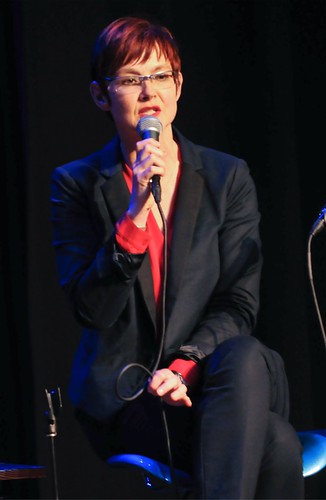It's always interesting to see what mayoral candidates say about streets and transportation in a public debate. Who's done their homework on transportation policy? Who understands in their gut why better streets for walking, biking, and transit are good for the city? Which candidates are willing to take a stand on these issues while making their case to voters?

Most households in New York, the city that I cover, are car-free, and mayoral transportation platforms that support better transit and safer streets are common enough. But on the debate stage, candidates seldom seem eager to court the fare-paying, bike-riding, walking-to-the-bus-stop vote.
There's a mayoral race underway in Portland this year, and on Monday eight candidates debated the issues. (Of note: The Oregonian originally limited the debate to two candidates, Ted Wheeler and Jules Bailey, but protesters successfully opened it up to six more.) Michael Andersen at Bike Portland has the recap:
Among other things that happened: one candidate (Sarah Iannarone) called in her closing statement for us to move gradually toward a car-free downtown. Another (Wheeler) suggested cutting service from the downtown Portland Streetcar to improve transit in East Portland. A third (Bailey) said the city’s top-priority transportation challenge is safety.
The BikePortland team submitted a debate question through a moderator at Willamette Week (The Oregonian was basically booted from its own debate after refusing to expand the field). Here's a look at what the candidates said...
What is the city’s biggest transportation problem and how would you fix it as mayor?*
(*We submitted this question! Thanks to Beth Slovic at Willamette Week for asking it.)
Bim Ditson: “I don’t think there’s a single biggest. i do think there are things we can look at to reduce traffic. … It’s been shown by almost every major city in the world that moving away from cars beenfits everyone’s safety and everyone’s mobility. … I would definitely be an advocate for expanded bike lanes. I would look at getting bikes away from cars so they don’t get hit by them.”
Iannarone (answering immediately after): “He’s 100 percent right on those fronts. We need to press for more money. … The gas tax is a road to nowhere; we know those can’t sustain but we’re going to have to come up with more money. … Making streets that work for everyone and not continue to subsidize the automobile any further because it is killing us.”
Schor: “We need to make some huge investments in bike infrastructure to make biking a priority. We need to focus on preventing displacement. we need to make sure that people can continue to live in the inner city.”
Harris: “Encourage employers, when they have different locations for businesses, try to encourage their employees to relocate closer to their work.”
Bailey: “Congestion is obviously a problem, maintenance is obviously a problem. But you asked about our biggest problem, and that has got to be safety. The stretch of 122nd …. is one of the most dangerous in the nation. … We need a better transit system with better rubber-tire bus service.”
Davis: “We need to increase density. If we have more density downtown and more people living downtown, we’re not going to have people using transportation as much.”
Wheeler: He said the city lacks adequate public transit. On biking, he said, “we need two things”: separated bike lanes and continued investment in the neighborhood greenway network, which he described as “cost effective” and “a way to support communities that don’t currently have parks.”
Elsewhere on the Streetsblog Network today: Dallas highway builders are ready to pour some asphalt and widen an 11-mile stretch of Interstate 635, reports the Dallas Morning News transportation blog has. The Washington Area Bicyclists Association says things are looking good for an important protected bike lane proposal in Arlington County. And Fairfax Advocates for Better Bicycling shows how local snow clearance efforts fail to keep sidewalks passable for kids walking to school.





